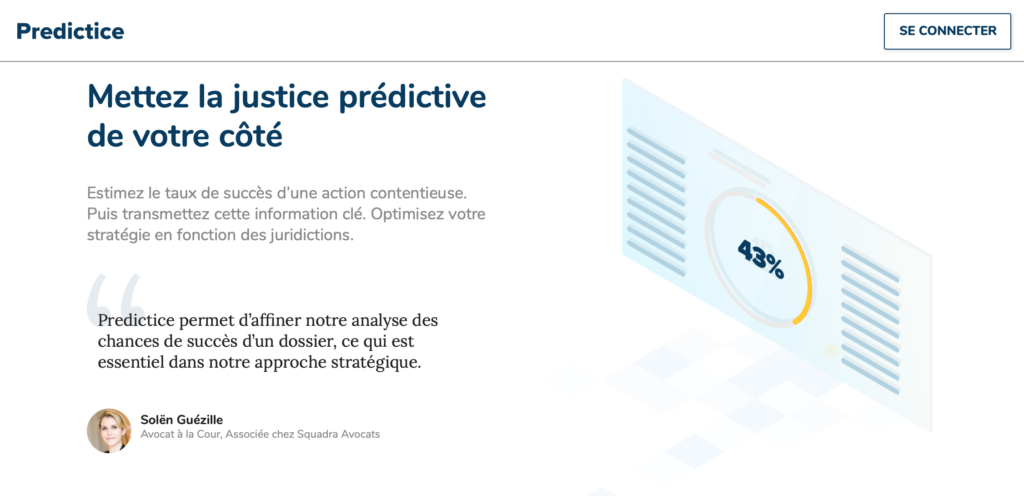
Yesterday, Artificial Lawyer wrote about how France had made it illegal to publish statistical information on named judges’ decisions. The reaction globally has been significant, with people from around the world stating their amazement that a democracy could want to hide from its people how particular judges think about the cases they rule upon.
The general view, at least as shared in comments, emails to Artificial Lawyer, and social media, is that this is a very bad idea, and we’ll have a look at some of those in a moment. But, first, a comment from someone potentially affected by the rule (see text at bottom of page for more detail on the new law).
This site reached out to Predictice, a pioneering AI-based legal tech company in France with a focus on litigation analysis and prediction. Louis Larret Chahine, MD and co-founder of the company replied:
‘These kind of laws are a disgrace for a democracy. Justice is dispensed on behalf of the people, trying to hide information from law professionals or citizens will never be the right thing to do.
The open government movement must not slow down. A lot of [French] congressmen claim to be pro-startups, it’s time to prove it and let everyone access case law, as the ‘Loi pour une République numérique‘ voted in 2016 said we will.
More than 2,000 lawyers and a vast majority of insurances companies (Axa, Allianz, Covéa) or major entities (Bouygues, BNP) are using Predictice on a daily basis for various purposes and this law will absolutely not impact them.
Our mission remains the same: simplifying the way people search and understand legal information. We will find other ways to give comprehensive information, by allowing analysis on courts but not on the name of the judge for example.
We’ll always choose clarity over darkness, information over obscurantism.‘
There’s a lot in this comment, so let’s unpack it a little. First, it’s clear that companies such as Predictice do not support the move – as one would expect. The move is seen as anti-democratic and ‘trying to hide’ information. The company notes that the move is not in keeping with the spirit of the progressive steps taken in 2016 to make public data available to all in the interests of building a more open and just society.
But, Predictice also believes they will continue to do well. As noted in the article yesterday, removing named judges from litigation analysis still leaves a lot of data on the table that can be analysed for the benefit of clients. In short, litigation prediction will go from strength to strength in France – just without the statistical data on judges as part of the analysis shared with tech company clients.

More generally, across the market were numerous comments showing genuine shock at the news. Here’s a few comments below:
‘A legal system must be open, transparent and always open to scrutiny, the second it uses criminal law to shelter it from criticism and review, it is becomes dangerous.’ – Fernando Garcia, lawyer.
‘The case law is public. How can you ban analyzing it?’ – Gary Moore, Asst Dean for Academic Tech, Uni of Southern California Law School.
‘I can see the future. It’s full of shady characters standing on dark street corners selling black market legal tech tools.’ – Alex Su, Logikcull
And, in defence of this new law? As mentioned yesterday there were several theories going around. One that popped up today was shared by French lawyer, Olivier Moussa, who in a tweet noted that an official review of the matter had argued:
‘The Constitutional Council says the ban avoids pressures and forum shopping strategies,
[and] – the French judiciary culture does not include profiling b/c judgments do not include the judges’ opinions: they are issued by the court as a whole.’
And perhaps there is some cultural difference here in relation to how Common Law courts and Civil Law courts work that needs to be noted.
The point about the ‘court as a whole’ issuing the decision is interesting – especially from a Civil Law context where the approach to the application of a codified legal system is different to the Common Law.
But….that said, at the end of the day a person – the judge – makes a decision and if that is the case it still seems odd not to permit the analysis of those decisions in detail, including the identity of the person who made those decisions.
But if a judge’s views or decision patterns are not important in this Civil Law system and that it’s just the court as a whole that’s giving the response, then why do people so much want to know what the judges think?
There’s clearly some important cultural and legal differences between Civil and Common law procedure, but it seems impossible for a judge’s pattern of decisions to not still be relevant in either system.
What Next?
Tech companies and legal publishers will clearly have to stop creating statistical analyses of named judges in France, that is for starters.
There remains a lot of information in case law that can be analysed to help clients, so the industry will keep going, and possibly grow even stronger from this as in some ways it’s been a massive advert for the power of litigation prediction technology. I.e. if it didn’t work then this would not even be an issue. It’s because it does work that the judges of France got so upset.
Can the rule be over-turned? For sure. All law can be changed if law makers wish it to be changed. But, legislation doesn’t usually come in and out of force very quickly. For the near future at least, this will be the status quo in France.
Does this impact companies outside of France? This is a tricky one. For example, if LexisNexis decided to do litigation analytics on French data, as it does on US data, would it be covered by this rule? I.e. can you provide the data analysis from America and not come under the French law? Simple answer: you probably need to consult a jurisdictional expert.
The reality is that France will just have to live with this new situation. The bigger issue now is whether other countries, especially Civil Law ones, decide to follow along and do the same thing. French judges are unlikely to be the only ones that don’t like having their decisions analysed in this way. Hopefully though, this will be a unique case in terms of actually banning analysis of named judges.
Conclusion
The irony is that it all started after the French Government sought to open up its public data records and place all manner of information online in the name of freedom and equality. How a good deed can trigger the unexpected!
No-one had reckoned that some very powerful people would object to how that easily accessible information would be used.
We have not heard the end of this. It may take some years to change the law, but it seems that one day it will have to.
—
The new law, encoded in Article 33 of the Justice Reform Act, is aimed at preventing anyone – but especially legal tech companies focused on litigation prediction and analytics – from publicly revealing the pattern of judges’ behaviour in relation to court decisions.
A key passage of the new law states:
‘The identity data of magistrates and members of the judiciary cannot be reused with the purpose or effect of evaluating, analysing, comparing or predicting their actual or alleged professional practices.’ *
Part of the French text covering the new law is below:
‘Les données d’identité des magistrats et des membres du greffe ne peuvent faire l’objet d’une réutilisation ayant pour objet ou pour effet d’évaluer, d’analyser, de comparer ou de prédire leurs pratiques professionnelles réelles ou supposées.
La violation de cette interdiction est punie des peines prévues aux articles 226-18, 226-24 et 226-31 du code pénal, sans préjudice des mesures et sanctions prévues par la loi n° 78-17 du 6 janvier 1978 relative à l’informatique, aux fichiers et aux libertés.’
(* Translated version above, via Google.)
1 Trackback / Pingback
Comments are closed.